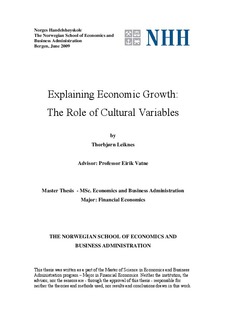| dc.description.abstract | Current economic growth theories have unexplained parts, and do not take into
account cultural variables at national levels. Since economic life happens in a
social context, this paper investigates further how the norms and goals of a
society affect economic development. The paper gives an overview of earlier
research on cultural variables and economic growth. Variables which are
identified as important are religion, social capital, political preferences, attitudes
towards institutions, and Hofstede’s cultural variables. The paper also tests
earlier findings empirically, and find that general trust in a society is significant
for economic growth, supporting findings from social capital theory. In addition,
increased religiosity and power distance is found to be negatively associated with
economic development, while individualism is positively associated. However,
these relationships are not strong. | en |
